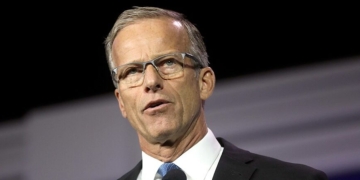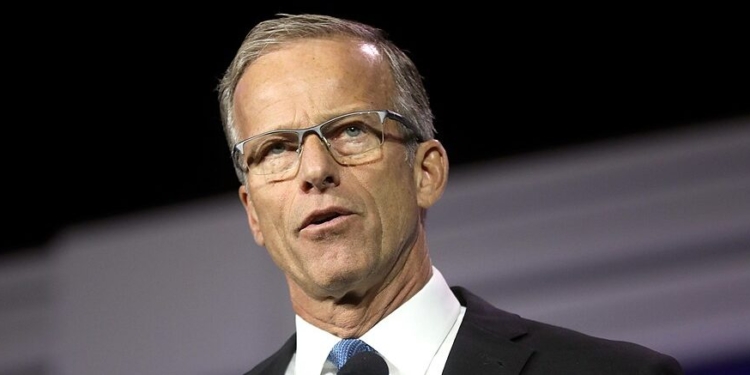Senate Republicans are proposing more expansive reforms to Medicaid in President Donald Trump’s “one big, beautiful” bill, defying naysayers who speculated the upper chamber would roll back House-passed provisions and pleasing fiscal hawks who urged the upper chamber to move in a more conservative direction.
The Senate Finance Committee unveiled the tax and Medicaid portion of the president’s landmark bill Monday evening following weeks of speculation about how far the upper chamber would go in altering the House-passed version. The Senate’s proposed changes to Medicaid make deeper reforms to the entitlement program than the initial House draft — by further tightening eligibility and work requirements and limiting states’ ability to use health care provider taxes to qualify for additional Medicaid funding.
The proposed Medicaid reforms are expected to surpass the projected $700 billion reduction in federal Medicaid spending included in the House-passed bill. Congressional Republicans are touting the floated Medicaid savings as part of the largest reduction to mandatory spending within a budget bill in American history.
The Senate’s aggressive reforms to Medicaid comes after Senate Majority Leader John Thune signaled to the DCNF in an interview Wednesday that the upper chamber would likely preserve or go beyond the House-proposed Medicaid reforms. Thune and like-minded GOP senators have defended their proposal against Democratic and intra-party criticism as a worthwhile effort to identify additional savings and strengthen Medicaid benefits for the vulnerable Americans the program was originally designed to serve.
Federal Medicaid spending has notably ballooned since the COVID-19 pandemic, jumping roughly 60% in size between 2019 and 2025. The entitlement program has also been enlarged to cover a much broader swathe of the U.S. population since the 2010 Affordable Care Act’s (ACA) Medicaid expansion, enrolling Americans with incomes of up to 138% of the federal poverty level, according to recent analysis from the conservative Paragon Health Institute.
“[T]his is a program that’s ripe for reform,” Thune told Fox News’ Will Cain Wednesday. “The things that we’re doing are going to strengthen it, improve it, and make it available to people for whom it was intended.”
“It shouldn’t be available for illegal immigrants,” Thune added. “There are people who are ineligible. There are people, able-bodied males who are of working age, there ought to be a work requirement attached to it. These are all reforms to a program that was desperately in need of reform.”
The Senate’s Medicaid proposal maintains work requirements on childless able-bodied adult beneficiaries between the ages of 19 and 64 to work, seek employment, volunteer or be in school for at least 20 hours a week. The upper chamber’s language broadens the scope of the House-proposed work requirements by also including adults with children of 14 years or older. The House reforms notably exempted adults with dependent children.
The Senate plan notably targets provider taxes by phasing down the cap that states are allowed to tax certain health care providers to receive additional federal Medicaid funding starting in 2027. The provision applies to 35 states that expanded Medicaid under the ACA and would require them to lower provider taxes to 3.5% by 2031, a reduction from the current 6% cap.
The Senate proposal also preserves House language effectively barring illegal immigrants from receiving state-funded Medicaid benefits. The provision would deter states by lowering federal Medicaid payments for the Medicaid expansion population in states that offer free healthcare to illegal immigrants.
Senate Democrats, who have already labeled the president’s landmark bill as the “We’re All Going To Die Act,” are expected to cry foul over the floated savings to the entitlement program.
The Senate finance panel’s Medicaid proposal could also be subject to uncomfortable criticism from a cohort of populist and moderate GOP senators urging the upper chamber to take a lighter touch to reforming Medicaid than the initial House bill.
Republican Missouri Sen. Josh Hawley, a populist who frequently breaks with his party on economic policy and healthcare issues, slammed the provider tax language in the Senate plan as an effort to “defund rural hospitals” to allegedly pay for the cost of preserving “Biden ‘Green New Deal’ subsidies.”
“That’s going to be a hard argument to make in Missouri,” Hawley told reporters.
The Senate proposal notably takes a less aggressive approach to phasing down green energy tax breaks enacted under former President Joe Biden than the House-passed version, which would have terminated certain tax credits almost immediately.
The Senate plan also permanently extends the president’s 2017 Trump tax cuts lowering federal income tax rates across the board and revises House provisions that temporarily eliminates taxation on tipped wages and overtime pay for certain Americans.
Thune and Senate GOP leadership are likely to make the case in the coming days that Senate Republicans’ proposed reforms to Medicaid are not cutting benefits, but just slowing the entitlement programs’ massive growth under Democrats’ expansion efforts.
“Even with these reforms, spending on Medicaid is projected to grow by billions of dollars over the next 10 years,” a summary of the bill text released by the Senate finance panel states. “Only in Washington is a smaller increase in funding considered a cut.”
“The Medicaid population that the program is designed to serve isn’t affected by this,” Thune told the DCNF on Wednesday.
Senate GOP leaders and the Trump White House have also touted polling that shows a majority of Americans support the imposition of work requirements on able-bodied adults and ensuring illegal immigrants do not receive taxpayer-funded health insurance.
The DNCF reviewed an internal White House poll showing that Medicaid work requirements have a net 32% favorability rating. Similarly, just over one and three Americans oppose Medicaid work requirements, according to a Washington Post-Ipsos poll released Tuesday.
“When you start breaking this stuff down … it really shifts that narrative in our direction,” Thune told the DCNF. “So, I’m hoping that our members will get out there and start messaging aggressively on that, because I think it’ll win the hearts and minds of the American people.”
All content created by the Daily Caller News Foundation, an independent and nonpartisan newswire service, is available without charge to any legitimate news publisher that can provide a large audience. All republished articles must include our logo, our reporter’s byline and their DCNF affiliation. For any questions about our guidelines or partnering with us, please contact [email protected].



























 Continue with Google
Continue with Google